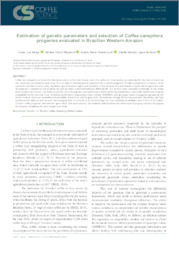Estimation of genetic parameters and selection of Coffea canephora progenies evaluated in Brazilian Western Amazon.
Estimation of genetic parameters and selection of Coffea canephora progenies evaluated in Brazilian Western Amazon.
Author(s): BERGO, C. L.; MIQUELONI, D. P.; LUNZ, A. M. P.; ASSIS, G. M. L. de
Summary: Coffee has emerged as an economic alternative culture in the State of Acre, Brazil, but without a clonal variety recommended for the state to overcome the unevenness presented by seed crops. Thus, in order to estimate genetic parameters and indicate progenies of Coffea canephora to compose a clonal variety for the State of Acre, yield, vegetative vigor and plant height were evaluated in five harvests of a randomized complete block experiment with 46 progenies, 4 repetitions and 10 plants per plot by mixed model methodology (REML/BLUP). The harvests were evaluated individually, by the model that considers one harvest, one location and the mean of progenies, and joint analysis (all harvests), by repeatability model with stability and temporal adaptability by the harmonic mean of relative performance of genotypic values method (MHPRVG), with genotypic values of progenies grouped by the Tocher method. There was variability, with possibility of selection, only for grain yield. The yield was strongly affected by production bienniality, with high environmental influence and harvests mean ranging from 14.13±4.60 to 46.20±14.94 bags ha-1 and individual heritabilities from 0.10 to 0.44. Sixteen ?Conilon? coffee progenies with selection gains above 23% were selected. The MHPRVG method allows the refinement of progeny selection throughout the harvests, identifying the most adapted and stable.
Publication year: 2020
Types of publication: Journal article
Unit: Embrapa Acre
Keywords: Acre, Amazonia Occidental, Amazônia Ocidental, Análise Estatística, Análisis estadístico, Café, Café Conilon, Campo Experimental, Coffea Canephora, Comportamento de Variedade, Embrapa Acre, Ensayos de variedades, Fitomejoramiento, Genetic variation, Melhoramento Genético Vegetal, Mixed model, Modelo mixto, Método REML/BLUP, Parâmetro Genético, Plant breeding, Progeny testing, Prueba de progenie, Rio Branco (AC), Statistical analysis, Teste de Progênie, Variación genética, Variety trials, Western Amazon
Observation
Some of Embrapa's publications are published as ePub files. To read them, use or download one of the following free software options to your computer or mobile device. Android: Google Play Books; IOS: iBooks; Windows and Linux: Calibre.
Access other publications
Access the Agricultural Research Database (BDPA) to consult Embrapa's full library collection and records.
Visit Embrapa Bookstore to purchase books and other publications sold by Embrapa.

